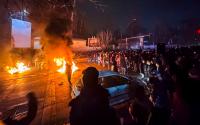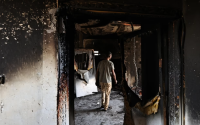10 July 2005Howard Friel and Richard Falk
It's time for the British and other Europeans to seriously ponder why the United States does the exact opposite of what needs to be done on virtually every global-policy front, including casting its dark shadow at Gleneagles this week on hopes for a solid G8 action plan on global warming. Given the extraordinary global reach of the United States, and the extraterritoriality of issues pertaining to war and peace and the earth’s environment, decisions made inside the White House or the newsroom at the New York Times could determine whether the U.K. will shortly resemble stepping stones in the North Atlantic due to global warming, as a recent report warned.[1]
In this context, it’s not enough to merely blame Bush and Cheney, or the most corrupt bunch of legislators in U.S. history, or the big oil and coal companies that currently enjoy unprecedented influence inside the White House and Congress. One must dig a bit deeper into the intellectual and moral decrepitude that so easily tolerates the worst this country has to offer at the worst possible time. This leads inexorably to our fierce watchdogs in the news media. And logically to the New York Times and the Wall Street Journal, the most prestigious and influential news organizations in the United States, which in fact do little to “enlighten the citizenry” and “expose government deception”—a reference to their squandered constitutional inheritance from the famous Pentagon Papers case in 1971 at the U.S. Supreme Court, which supported publication of a major exposé of government lies about Vietnam.
Today, the news-media environment in the United States hardly reflects that brief moment of journalistic distinction. For example, when the Bush administration, in the wake of 9/11, began to threaten an invasion of Iraq on WMD grounds, both the right-wing editorial page of the Wall Street Journal and the liberal editorial page of the New York Times enthusiastically supported the WMD charges against Iraq. Both editorial pages supported an invasion on WMD grounds. And both, in their own way, scorned the rules and principles of international law that prohibited such an invasion under the circumstances.
For its part, while supporting the Bush administration’s threats to invade Iraq, in addition to its rejection of the Kyoto Protocol, the International Criminal Court, and the ABM treaty, the Wall Street Journal editorial page announced “we are replacing the old rules [of international conduct] with new ones, and the world will be better for it.”[2] When U.N. Secretary General Kofi Annan counseled in November 2002 that “we need to be patient and give the [UN] inspectors [in Iraq] time and space to do their work,” the Journal’s editorial page, while quoting these words, said “Some friend—Richard Holbrooke maybe, or Bill Clinton—ought to do Mr. Annan a favor and tell him to put a sock in it for the sake of his own institution.”
This Wall Street Journal editorial on Annan, and an earlier one expressing profound regret that he and the United Nations were jointly awarded the 2001 Nobel Peace Prize,[3] launched a rancorous smear campaign against Annan featuring personal attacks and a mocking use of his first name in the title of each editorial and opinion piece as follows: “Kofi’s Choice (October 15 2001); “Kofi Annandersen” (September 25 2002); “Kofi’s Patience” (November 15 2002); “Colin in Kofiland” (October 13 2003); “Kofi’s Coverup” (May 11 2004); “Kofi’s Law” (September 20 2004); “Kofi Does It Again” (November 8 2004); “Dear Kofi” (November 10 2004); “Kofi’s Heroes” (November 12 2004); “Come Clean, Kofi” (November 17 2004); “Is Kofi Done” (December 3 2004); “Time For a Kofi Break” (December 5 2004); “Kofi’s Accountability” (March 30 2005); and “Stale Kofi” (April 20 2005).
There was also “The UN’s Refugees” (April 18 2002) with the pull-quote “U.N. agencies have been complicit in Mideast terror” placed next to a mug shot of Kofi Annan; “The U.N.’s Dirty Little Secret” (December 8 2003) with the pull quote “It has rejected the very idea of Jewish victimhood” placed next to the same mug shot of Annan; “Saddam’s Global Payroll” (February 9 2004) with the pull quote “It is time for a thorough audit of the U.N.’s books” placed directly above side-by-side mug shots of Kofi Annan and Saddam Hussein; and “Kofi Annan Must Go” (December 1 2004).
In contrast to the obvious contempt at the Wall Street Journal for the United Nations, its secretary general, and the U.N. Charter, the New York Times editorial page is more discreet: it simply ignores international law altogether as it applies to US foreign policy. For example, from September 11 2001 to March 20 2003 (when President Bush launched the invasion of Iraq), the New York Times editorial page never mentioned the words “UN Charter” or “international law” in any of its 70 editorials on Iraq, despite repeated invasion threats from the Bush administration within this time period. In short, the best thing one might say about the Wall Street Journal and New York Times coverage of the Bush administration’s policy toward Iraq is that they have failed to enlighten the American citizenry and expose government deception with respect to that policy. Likewise with global warming.
As early as two weeks ago, the Wall Street Journal published a lengthy, lead editorial that said “the case for linking fossil fuels to global warming has, if anything, become even more doubtful,” and “President Bush can in good conscience offer a polite rebuff to his friend Tony Blair when the British Prime Minister presses for American action on climate change at the upcoming G8 summit in Scotland.”[4] This editorial position at the Wall Street Journal on global warming is consistent with its position on this issue over the past several years.
While the New York Times is not quite so medieval in its view of science, it is nevertheless loaded with fear if not loathing for the cause of global-warming prevention. This is because a political point of view is not permitted at the Times, even one that might prevent the permanent flooding of its new, future office tower in Manhattan. Thus, instead of baking no cake at all to help prevent global warming, the Times bakes half a cake, or a third, so as not be seen as too bullish for the cause. In practice, this means, for example, that while the Times published a recent front-page article on how a White House official edited government-issued global-warming reports in order to dilute the findings of government climate scientists,[5] its editorial page completely ignored the G8 summit in the context of its focus on global warming. The editorial page also completely ignored the leaked G8 draft memos on global warming, reported throughout the British press, that revealed the Bush administration’s ongoing rejectionism of the scientific and political consensus on global warming. Nor has the New York Times paid much if any attention to the seemingly endless series of scientific papers and reports since the beginning of the year that consistently support worst-case global warming scenarios.
And this reflects the best coverage at the Times to date on global warming, prompted perhaps by the fact that it can now claim, as it does, General Electric and California Governor Arnold Schwarzenegger as fellow global-warming activists.[6] Not too long ago, however, the New York Times editorial page opposed doing anything meaningful to prevent global warming. One month before the 1992 Rio summit, the editorial page argued that while “the Bush administration has drawn sharp criticism for weakening the global warming treaty that will be signed at the UN environmental conference next month in Brazil … the
Administration’s opposition to mandatory limits was on solid ground—the need is not yet proved and the cost would be high.” The editorial noted that major climate change, though conceivable, was “unlikely.”[7] When the newly elected President Bill Clinton announced in late 1993 that he would not pursue mandatory emissions reductions, the Times editorial page supported that position, observing that Clinton’s “plan relies heavily on voluntary actions, [and] goes light on regulatory actions” and thus is “a reasonable response to a distant crisis whose dimensions are uncertain.” The editorial also counseled that global warming “is not an issue on which the President should spend much political or economic capital just yet.”[8]
Because it almost completely ignored the Bush administration’s position on global warming leading up to the G8 summit, and thus did nothing to help enlighten the citizenry about this reckless position, it is quite clear, even as late as 2005, that the New York Times views global warming as an issue on which it will spend no political or journalistic capital. This helps to explain, as with Iraq, why the Bush administration is able to continue to violate nearly every international norm of conduct, and thus continue to outrage the world, with impunity.
Howard Friel and Richard Falk are the authors of The Record of the Paper: How The New York Times Misreports US Foreign Policy (Verso, 2004). They are also the authors of The Record of the Paper (vol. 2): How The New York Times Misreports the Israel-Palestine Conflict (Verso, 2006).
[1] “Climate Change ‘To Drown Britain,’ ” The Independent, June 28 2005. [2] Robert L Bartley, “Engaging the Irritating Europeans,” Wall Street Journal, April 22 2002. [3] “Kofi’s Choice,” Wall Street Journal, October 15, 2001. [4] “Kyoto By Degrees,” Wall Street Journal, June 21 2005. [5] “Bush Aide Edited Climate Reports,” New York Times, June 8 2005. [6] “Feeling the Heat,” New York Times, June 14 2005; “A White House Party for Lobbyists, New York Times, June 9 2005; “Climate Signals,” New York Times, May 19 2005. [7] “On Global Warming: Why So Chilly,” New York Times, May 24 1992. [8] “Warming Up to Global Warming,” New York Times, November 6 1993






